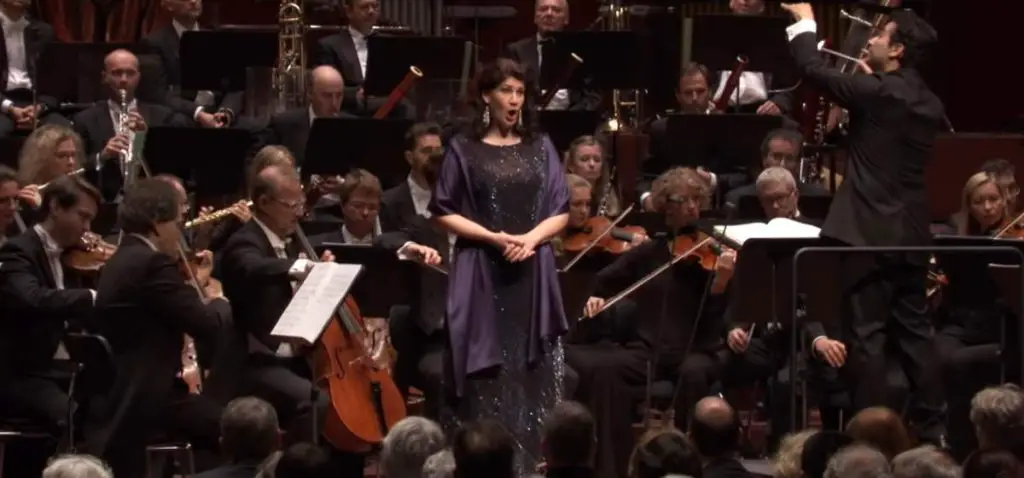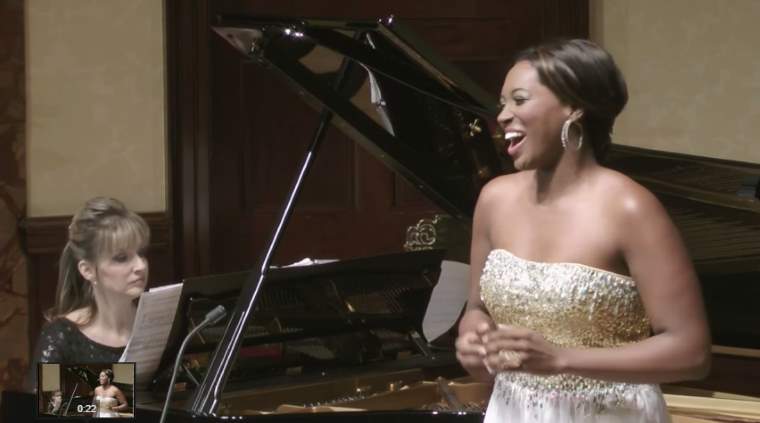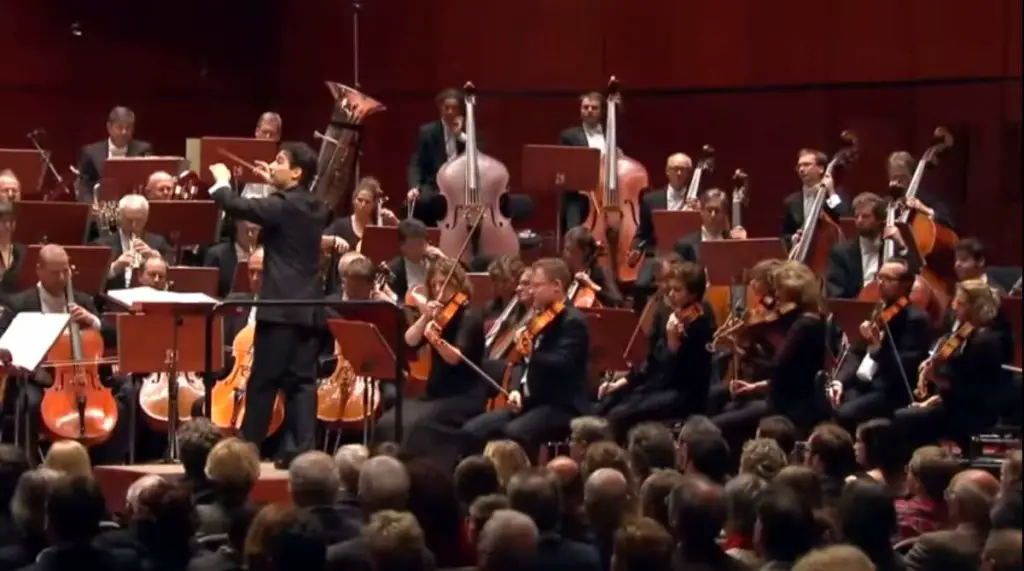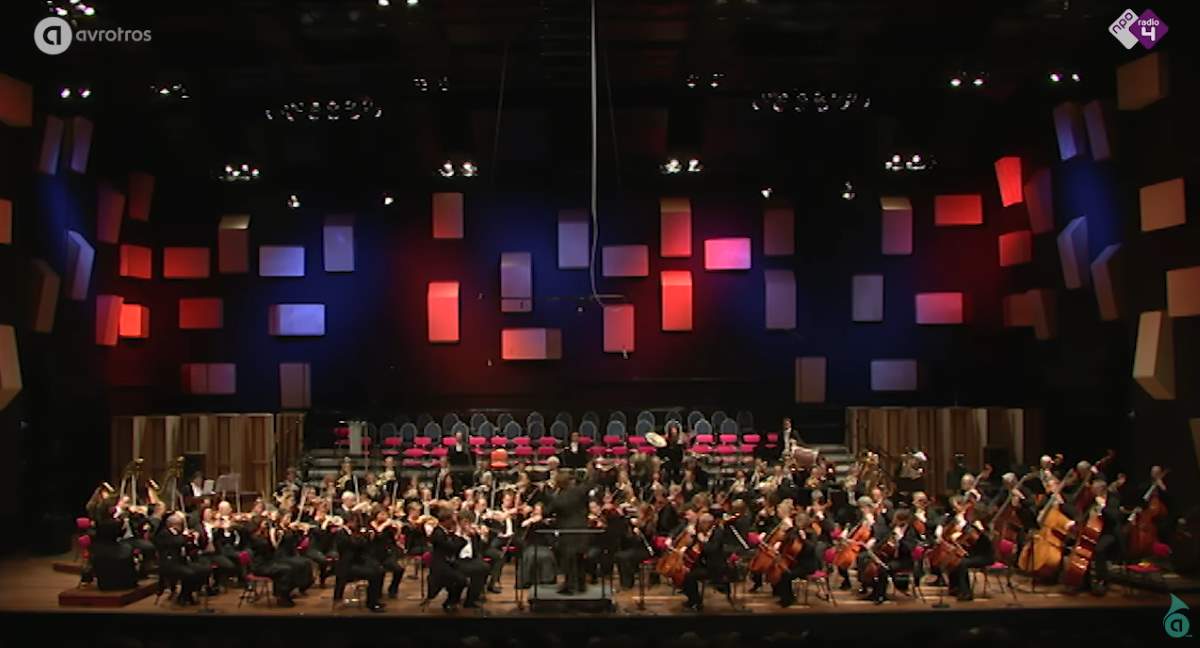German soprano Anja Harteros performs Richard Strauss’ Four Last Songs (German: Vier letzte Lieder), Op. posth., for soprano and orchestra. hr-Sinfonieorchester (Frankfurt Radio Symphony Orchestra) conducted by Andrés Orozco-Estrada.
Richard Strauss’ Four Last Songs
The Four Last Songs (German: Vier letzte Lieder), Op. posth., TrV 296, AV 150, for soprano and orchestra are, with the exception of the song “Malven” (Mallows) composed later the same year, the final completed works of Richard Strauss, composed in 1948 when the composer was 84.
The songs are “Frühling” (Spring), “September”, “Beim Schlafengehen” (When Falling Asleep) and “Im Abendrot” (At Sunset). The title “Four Last Songs” was provided posthumously by Strauss’s friend Ernst Roth, who published the four songs as a single unit after Strauss’s death.
Lyrics
1. “Frühling” (“Spring”)
Text: Hermann Hesse
Composed: July 20, 1948
German
In dämmrigen Grüften
träumte ich lang
von deinen Bäumen und blauen Lüften,
Von deinem Duft und Vogelsang.
Nun liegst du erschlossen
In Gleiss und Zier
von Licht übergossen
wie ein Wunder vor mir.
Du kennst mich wieder,
du lockst mich zart,
es zittert durch all meine Glieder
deine selige Gegenwart!
English translation
In shadowy crypts
I dreamt long
of your trees and blue skies,
of your fragrance and birdsong.
Now you appear
in all your finery,
drenched in light
like a miracle before me.
You recognize me,
you entice me tenderly.
All my limbs tremble at
your blessed presence!
2. “September”
Text: Hermann Hesse
Composed: September 20, 1948
German
Der Garten trauert,
kühl sinkt in die Blumen der Regen.
Der Sommer schauert
still seinem Ende entgegen.
Golden tropft Blatt um Blatt
nieder vom hohen Akazienbaum.
Sommer lächelt erstaunt und matt
In den sterbenden Gartentraum.
Lange noch bei den Rosen
bleibt er stehn, sehnt sich nach Ruh.
Langsam tut er
die müdgeword’nen Augen zu.
English translation
The garden is in mourning.
Cool rain seeps into the flowers.
Summertime shudders,
quietly awaiting his end.
Golden leaf after leaf falls
from the tall acacia tree.
Summer smiles, astonished and feeble,
at his dying dream of a garden.
For just a while he tarries
beside the roses, yearning for repose.
Slowly he closes
his weary eyes.
3. “Beim Schlafengehen” (“Going to sleep”)
Text: Hermann Hesse
Composed: August 4, 1948
German
Nun der Tag mich müd gemacht,
soll mein sehnliches Verlangen
freundlich die gestirnte Nacht
wie ein müdes Kind empfangen.
Hände, lasst von allem Tun
Stirn, vergiss du alles Denken,
Alle meine Sinne nun
wollen sich in Schlummer senken.
Und die Seele unbewacht
will in freien Flügen schweben,
um im Zauberkreis der Nacht
tief und tausendfach zu leben.
English translation
Now that I am wearied of the day,
my ardent desire shall happily receive
the starry night
like a sleepy child.
Hands, stop all your work.
Brow, forget all your thinking.
All my senses now
yearn to sink into slumber.
And my unfettered soul
wishes to soar up freely
into night’s magic sphere
to live there deeply and thousandfold.
4. “Im Abendrot” (“At sunset”)
Text: Joseph von Eichendorff
Composed: Composed: May 6, 1948
German
Wir sind durch Not und Freude
gegangen Hand in Hand;
vom Wandern ruhen wir
nun überm stillen Land.
Rings sich die Täler neigen,
es dunkelt schon die Luft.
Zwei Lerchen nur noch steigen
nachträumend in den Duft.
Tritt her und lass sie schwirren,
bald ist es Schlafenszeit.
Dass wir uns nicht verirren
in dieser Einsamkeit.
O weiter, stiller Friede!
So tief im Abendrot.
Wie sind wir wandermüde-
Ist dies etwa der Tod?
English translation
We have through sorrow and joy
gone hand in hand;
From our wanderings, let’s now rest
in this quiet land.
Around us, the valleys bow
as the sun goes down.
Two larks soar upwards
dreamily into the light air.
Come close, and let them fly.
Soon it will be time for sleep.
Let’s not lose our way
in this solitude.
O vast, tranquil peace,
so deep in the evening’s glow!
How weary we are of wandering-
Is this perhaps death?
Anja Harteros

Anja Harteros (born 23 July 1972) is a German operatic soprano. In 1999, she became the first German to win the Cardiff Singer of the World competition.
Peter Jonas, director of the Bavarian State Opera, who was in the jury, recognized her talent and engaged her in the role of Agathe in Der Freischütz, a German opera with spoken dialogue in three acts by Carl Maria von Weber with a libretto by Friedrich Kind.
In 2003/04, Harteros made her New York Metropolitan Opera debut with Countess Almaviva, and also sang Donna Anna in Don Giovanni in the same season.
She won the Festival Award of the Munich Opera Festival for her four role debuts. She was voted Female Singer of the Year (Sängerin des Jahres) by the Opernwelt magazine in 2009, and again in 2017.
On 19 June 2010, she received the first edition of the Cologne Opera Award (Kölner Opernpreis) from city mayor Jürgen Roters with laudation from Peter Jonas in a ceremony in the Cologne City Hall, which was to take place on 17 April but was postponed due to the 2010 Icelandic volcano eruption.
She won the Best Female Singer in the 2015 International Opera Awards.
In 2007, she was appointed the title Bavarian Kammersängerin. In 2013, she was awarded the Bavarian Europa-Medaille. In 2018, she was awarded European Cultural Award Taurus, yet she was absent from the ceremony at the Dresden Frauenkirche on 8 June 2018. In the same month, she received the Bavarian Order of Merit.
Following her Tosca performance on 3 November 2019 at the Bavarian State Opera, celebrating her 20th anniversary since her debut with the company, she was awarded the Meistersinger-Medaille in honor of her artistic contribution
Sources
- Four Last Songs on Wikipedia
- Anja Harteros on Wikipedia


